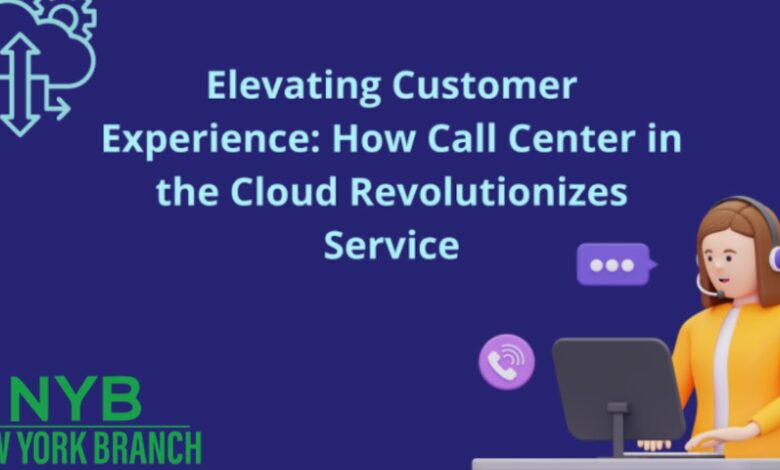Elevating Customer Experience: How Call Center in the Cloud Revolutionizes Service

Are you constantly racing against the clock to meet service demands with limited resources? Do unexpected call spikes result in long customer wait times that damage your brand? You’re not alone. Many call centers still rely on inflexible legacy on-premise setups that struggle to match today’s dynamic service needs.
But what if you could instantly scale your operation to handle any customer volume without expensive infrastructure upgrades? That’s the game-changing advantage cloud-based contact centers provide. Read on as we explore how the cloud revolutionizes call centers by enabling seamless scalability, lower costs, smoother technology integration, and elevated customer experiences. The future of adaptive and personalized customer service is here. It’s time to ascend to the cloud.
Introduction to Cloud-Based Call Centers
Are you constantly racing against the clock to meet service demands with limited resources? However, scaling or upgrading capacity can lead to headaches, from disruptive integrations to prohibitive capital costs. Cloud-based call centers completely transform this model.
By leveraging the internet to deliver essential capabilities via subscription-based services, cloud platforms eliminate hardware dependencies. Agents simply need internet-connected devices to access the same call routing, management, and analytics tools without any facilities footprint. This enables unprecedented flexibility to spin capacity up or down on demand.
Built-in redundancy across global data centers also provides resilience that on-premise systems can’t match. Recognizing these advantages, IDC predicts over 75% of customer interactions will utilize cloud-enabled technologies like AI by 2022. As customer expectations and options grow, the worldwide market for cloud contact centers is projected to reach $20.18 billion by 2025. Forward-thinking call centers are rapidly migrating to the cloud to equip their operations for the future with scalability, resilience, and accelerated innovation.
Benefits of Cloud Contact Center Software
The quantifiable benefits of switching to a call center in the cloud are too compelling to ignore for many call centers today. Cloud platforms eliminate the need for upfront hardware investments, enabling rapid deployment and allowing agents to use omnichannel call center software capabilities within weeks instead of months. This speed to service gives a competitive advantage.
Seamless scalability inherent in the cloud allows adjusting capacity seasonally to align with fluctuating contact volumes without disruption. This prevents poor service from overloaded systems during peaks. The distributed nature of cloud infrastructures also provides built-in resilience to minimize downtime risks that plague on-premise setups reliant on local systems.
Additionally, pay-as-you-go pricing models reduce the sizable capital expenditures associated with on-premise deployments and refresh cycles. For call centers feeling constrained by limited scalability and innovation potential, the cloud offers a gateway to enhanced performance.
The Role of AI and Automation
Integrating AI-driven automation with cloud contact center functionalities, bolstered by omnichannel software opens new opportunities to optimize operations and elevate customer service. As Intel CEO Says About Central Role of Chipmaker’s Technology in AI Boom, “AI workloads prefer to run on Intel architecture.”
Chatbots efficiently handle high-volume routine inquiries, providing instant self-service for customers to resolve more needs without agent assistance. Smart call routing applies AI algorithms to analyze caller voice patterns and data insights to connect each contact to the agent best suited to the interaction context from the outset.
This strategy prevents frustrating transfers and repetition for customers, enhancing their experience. Post-call surveys powered by natural language processing also gather open-ended customer feedback and sentiments to surface training improvement opportunities. As manual tasks get automated, agents focus more attention on delivering personalized service.
Enhancing the Employee Experience
While AI automation handles repetitive low-level interactions, cloud contact center capabilities empower agents to focus energy on thoughtful engagement. Flexible work-from-anywhere policies, facilitated by cloud accessibility, attract and retain top talent valuing location flexibility. Online self-service training content enables agents to learn through bite-sized modules during spare moments between calls, avoiding overwhelming classroom sessions.
Gamification applies gameplay mechanics to skills development by awarding badges and rewards for completing training levels. This further engages agents in advancing expertise. By automating tasks and streamlining learning, cloud platforms enhance employee satisfaction, engagement, and performance.
Measuring Customer Experience
To quantify service improvements from investments in cloud contact centers and associated AI capabilities, call centers track essential KPIs. Customer Effort Score (CES) surveys measure the simplicity and convenience of interactions based on customer post-call feedback. Lower effort equates to higher satisfaction.
Net Promoter Score (NPS) helps gauge customer loyalty and value. The likelihood a customer will recommend a brand indicates higher retention and lifetime value potential. Customer Satisfaction Score (CSAT) surveys also rate overall call experience sentiment from poor to excellent.
Analyzing interactions with poor CSAT ratings helps centers identify areas requiring improvements in agent training or process enhancements to streamline customer journeys. According to Deloitte research, leading cloud contact centers increased customer satisfaction rates by 20% within months of deployment. These metrics provide tangible insights into progress.
Future Trends in Cloud Call Centers
As AI natural language processing and sentiment analysis rapidly mature, the next generation of cloud contact center innovation promises even more nuanced and contextual customer engagements. With advanced chatbots, simple inquiry resolution will mimic natural human conversation tailored to the customer’s unique needs and history. Predictive analytics will prompt proactive agent outreach to customers, identifying potential needs through data patterns before issues arise.
Omnichannel customer support software integration will seamlessly blend messaging, live web chat, video, and voice interactions into a single customer conversation, rather than creating disjointed touchpoints. Leading researchers predict over 85% of all contact centers will rely on cloud-based infrastructure within the next few years given its advantages for innovation velocity, resilience, and scalability.
Frequently Asked Questions
- What are the main benefits of a cloud call center?
The primary benefits are faster deployment, scalability, built-in resilience, lower costs, and easy integration of innovations like AI. Cloud platforms require no major on-site hardware investments.
- How does AI improve customer service?
AI chatbots handle routine questions to resolve more inquiries instantly without human agents. Smart call routing uses data to connect customers to the best agents from the start. Post-call survey AI gathers feedback to improve training.
- What metrics indicate call center success?
Key indicators are the Customer Effort Score (CES) to measure interaction complexity, the Net Promoter Score (NPS) for gauging loyalty, and the Customer Satisfaction Score (CSAT) to rate overall experience sentiment.
- How does the cloud enhance the employee experience?
Flexible remote work opportunities improve work-life balance. Self-service online training facilitates continuous learning. Gamification increases engagement with skills development. Together this boosts recruitment, retention, and empowerment.
- What emerging technologies will affect cloud call centers?
Future trends include hyper-personalized service through AI, predictive engagement fueled by analytics, and integrating messaging/chat with voice on a single platform for omnichannel customer journeys.
Conclusion
Cloud contact center solutions provide undisputed advantages for call centers seeking to innovate faster, operate resiliently, and deliver standout customer service. Thanks to broad accessibility and continuous enhancements, the cloud offers a future-proof foundation.
Combined with emerging capabilities like AI-powered automation, cloud technology enables contact centers to align customer experiences with exceeding expectations. The results speak for themselves: improved agent engagement, increased retention, and more referrals. The cloud offers a clear path forward for call centers seeking a transformational leap in service quality.



